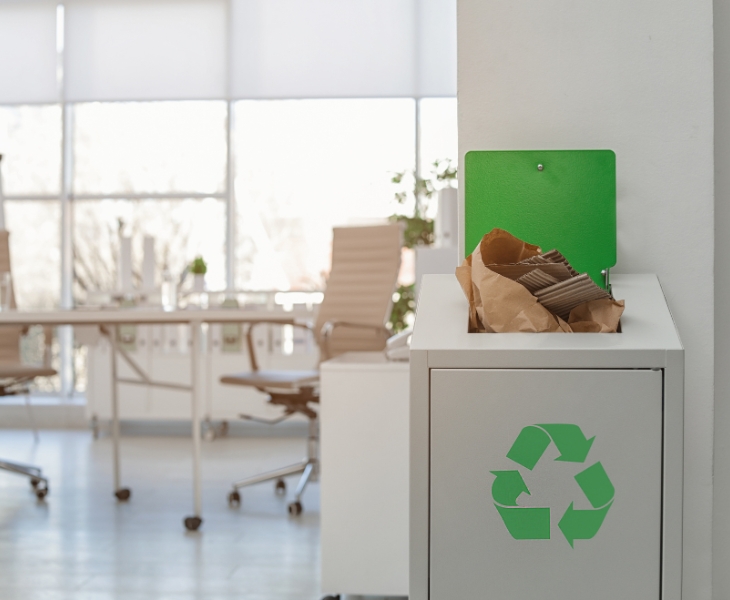According to the Nation Waste Report 2022, Australians produced around 76 million tonnes (Mt) of waste during the 2020-2021 financial year. Around 22.8 Mt of this waste was comprised of organic waste (14.4 Mt), paper and cardboard (5.8 Mt) and plastic (2.6 Mt).
Office waste can come in many forms, from packaging of products to bags, paper, printer toner and even pens. With so many sources of waste being not only common but all but essential to the workplace, how can organisations go about reducing waste in the workplace?
Foster a Culture of Sustainability
Conduct training sessions, workshops, or small group sessions to educate employees about the importance of office waste reduction and recycling. Doing so can help make waste reduction second nature for employers and employees alike.
Raise awareness about recycling guidelines and the proper disposal of different materials. Develop and distribute simple recycling guidelines that outline what can and cannot be recycled in the office. Include information about specific recycling programs in the area and any unique recycling processes within the office.
Clearly labelled recycling bins for paper, plastic and aluminium can make it simple for staff to sort and properly dispose of office waste. Easily accessible bins for organic waste, from coffee grounds and teabags to discarded food can help eliminate any contamination of recyclable materials. If your office has a garden or green area, organic waste can make excellent compost.
Caffeinate Wisely
Coffee pod machines are a quick and convenient way to get a caffeine fix, but they are also responsible for creating a huge amount of plastic waste. The University of Melbourne estimates that Australians use and discard around three million plastic and aluminium coffee pods daily, most of which end up in landfill, even though many pods are recyclable.
Having a clearly labelled coffee pod recycling bin close to coffee making facilities is a good way to remind employees to dispose of pods correctly. Better yet, buy biodegradable or aluminium coffee pods. Biodegradable coffee pods can be added to compost along with other food waste. Aluminium pods don’t contain any plastic at all so are completely recyclable.
A quality coffee machine that grinds coffee beans to order can offer the convenience of a coffee pod machine while saving money and waste. Roasted coffee beans are cheaper than coffee pods by weight and require less packaging to boot!
Eliminate Single Use Items
Disposable cups, plates, cutlery and single serve sachets and other single use items all add to office waste. Thankfully replacing single use items with reusable options is simple. Rather than buying plastic or paper cups, investing in glasses and mugs ensures that staff members and guests can get their coffee without adding to landfill. Replacing paper plates and plastic cutlery with washable plates and cutlery can also eliminate a source of waste.
You could also opt for reusable, recyclable takeaway cups and lids. These cups can be washed and reused multiple times. They are made of recycled materials and can be recycled if they are damage or are no longer usable. Although they may seem small, single serve sugar and salt sachets, or individually sealed teabags can all add up to lot of waste.
Opting for a simple container of sugar or salt and keeping bulk teabags in an airtight container gives the same convenience without the need for all the extra packaging. Encouraging employees to purchase reusable coffee cups and water bottles, or providing staff with them, can help reduce the amount of waste that comes into the office.
Buy in Bulk
Buying in bulk can potentially reduce office waste in several ways, from reduced packaging waste, less production waste and even less transport waste. Bulk buying significantly reduces the amount of packaging waste generated. Instead of multiple smaller packages, products are typically stored in larger containers or bulk bins. This reduces the need for individual packaging materials such as plastic wrappers, boxes, or bottles, resulting in less waste sent to landfills or recycling facilities.
By purchasing in bulk, organisations can reduce the number of deliveries needed, thereby decreasing fuel consumption and greenhouse gas emissions associated with transportation. Similarly, when products are packaged in smaller sizes, more resources are required for manufacturing and transportation. Buying in bulk reduces the overall demand for packaging materials and the energy needed for their production.
When possible, buy from distributors that are members of Australian Packaging Covenant Organisation (APCO). Members of APCO are dedicated to ensuring that all packaging is 100% recyclable, compostable or reusable by 2025, as well as eliminating single use plastic packaging.
Print Smart
It’s estimated that around 350 million printer cartridges end up in landfill each year and can take up to 1000 years to decompose. According to Cartridge World, Australians send around 34 printer cartridges to landfill every minute. For many organisations, eliminating printing is not possible, but reducing the amount of toner and printer cartridges can significantly reduce office waste.
When printing, using a setting that uses minimal ink. These settings are typically marked as “Fast” or “Draft”. Avoiding colour printing can also significantly cut down on cartridge waste. Changing printing habits can also help cut down on paper waste. Setting printers to automatically print double sided documents can significantly reduce paper consumption.
Good Paper
It’s not possible to eliminate paper from an office, but there are ways to reduce paper wastage without having to change business practices. No matter how much you may need to print, choosing the right paper can still significantly reduce paper waste.
Rather than opting for heavy duty paper for all printing, try a lighter paper stock such as Opti New Future. Lighter gage paper can help minimise overall waste. Did you know that the wrappers for numerous types of paper aren’t recyclable? When possible, but paper with a recyclable or biodegradable wrap. If you do need to use heavier grade paper, try to opt for recycled paper.
As part of the COS commitment to eliminating single use packaging and minimising our environmental impact, COS premium paper is shipped in boxes that don’t require plastic strapping. That one simple change in packaging stops more than 700,000 plastic straps winding up in landfill each year.

